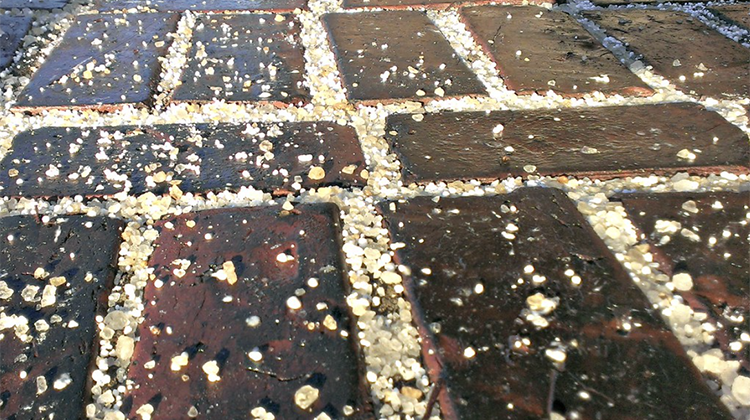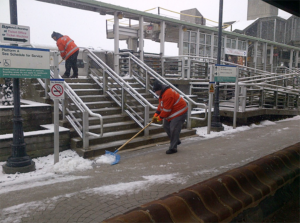
Removing Snow from Pavers
Are you worried that removing snow from brick pavers will damage or scratch them? How do you safely remove snow from your driveway, patio, or front entrance? Are de-icing salts bad for my driveway? Are snow blowers safe for my driveway?
If you live in an area of heavy snowfall like Northern Indiana, you may be used to clearing snow from your driveway and walkway leading into and out of your home or business. But, what about your pavers? Many modern pavers have special properties giving them vibrant color, in fact, even traditional concrete pavers aren’t invulnerable.
How best should you care for these pavers when the snow and ice fall?
Clearing the Snow

The best advice when clearing snow from pavers is to use a plastic shovel without a metal edge whenever possible, or alternatively use plastic blade protectors. It’s safe to use a snow blower on pavers but you should use a plastic shoe on the ends.
Metal shovels can not only scratch the surface of stone pavers, but they can also leave behind tiny particles which can rust into your pavers and eventually affect their visual appeal.
Choosing the Right De-icer
Common rock salt (sodium chloride) is Widely used on pavers. Sodium chloride is a safe, budget-friendly option; however, it does have some downfalls.
1. Effective temperature: 15 °F (-9 °C) and above
2. Risks: Can damage grass, plants & metal
Sodium chloride can also damage pavers if soaked into porous pavers once melted. A good defensive measure is to rinse off the salt, although be wary of your lawn and flower beds, the salt can make the soil inhospitable.
Calcium chloride
A slight step up from sodium chloride, this salt is effective at lower temperatures and is less damaging to lawns. Calcium chloride products are often designed to minimize the spread of melted ice, both into your home and between the pavers.
Effective temperature: 0 °F (-18 °C) and above
Risks: Can damage concrete in heavy doses
In very high concentrations, calcium chloride can be damaging to concrete pavers. It is also a known skin irritant so we recommend wearing gloves.
Potassium Chloride
Perhaps the most expensive but all round better for your pavers and the environment.
- Effective temperature: 12 °F (-11°C) and above
Potassium chloride does not chemically attack concrete; however, the downside is that it is slower acting than other salts.
De-icing Salts – General Rules
As a general rule, calcium-based products are best for use on pavers. De-icers that contain magnesium can be very damaging to concrete and decorative pavers and are not recommended. Be aware of “myths” that claim the benefits of magnesium-based salts for de-icing.
If you are unsure what is in the products you are using, do not risk it when it comes to concrete! Instead, use sand to prevent slips and slides. Lastly, After the winter season, thoroughly wash the paver surface to remove any excess deicing chemical remaining.




